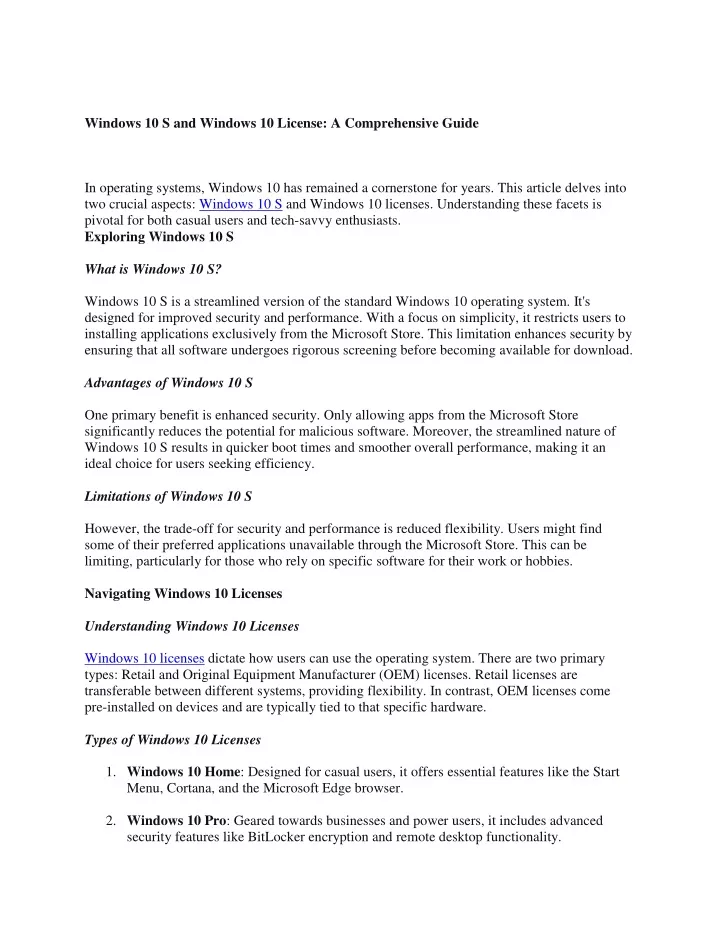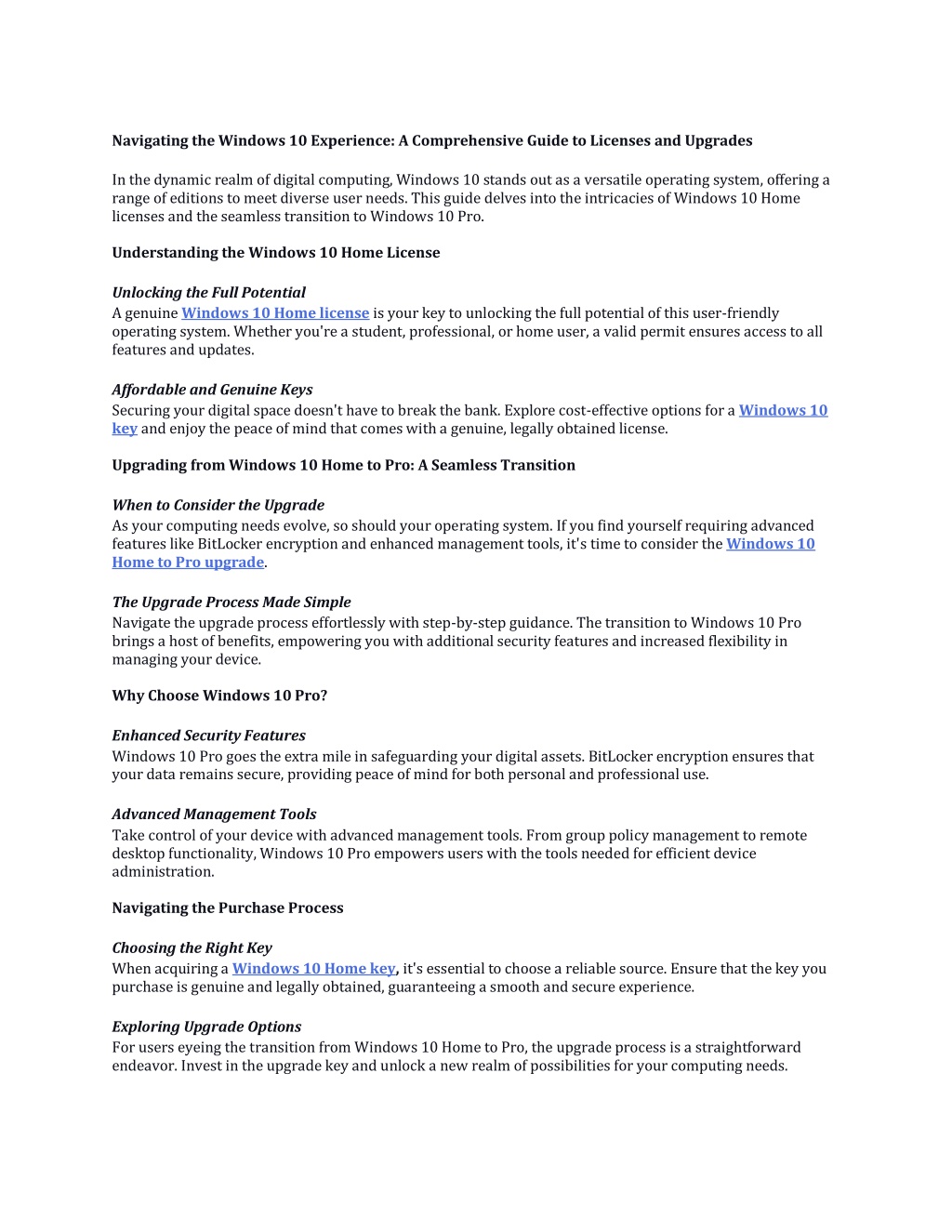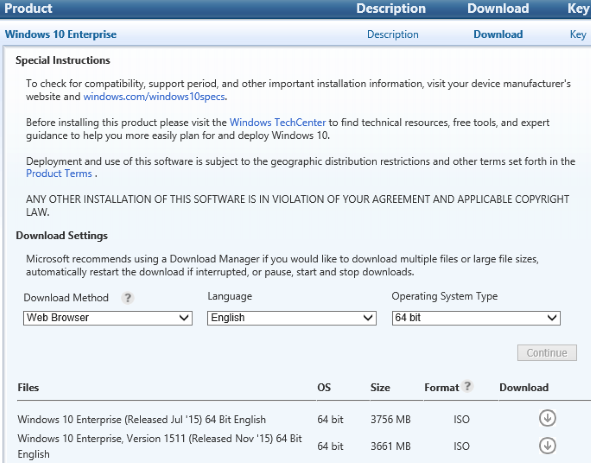Understanding Windows 10 Licensing: A Comprehensive Guide
Related Articles: Understanding Windows 10 Licensing: A Comprehensive Guide
Introduction
With great pleasure, we will explore the intriguing topic related to Understanding Windows 10 Licensing: A Comprehensive Guide. Let’s weave interesting information and offer fresh perspectives to the readers.
Table of Content
Understanding Windows 10 Licensing: A Comprehensive Guide

The intricate world of software licensing can often feel like a labyrinth, particularly when it comes to operating systems like Windows 10. While the term "Windows 10 license key 2025" might evoke a sense of urgency or specific time-bound validity, the reality is more nuanced.
This article aims to demystify the complexities surrounding Windows 10 licensing, providing a comprehensive understanding of its key aspects and dispelling common misconceptions.
Windows 10 Licensing: A Primer
Windows 10, like any other software, requires a license to operate legally. This license grants users the right to install and use the software on a specific device. The licensing model employed by Microsoft for Windows 10 is multifaceted, offering various options tailored to different needs.
Types of Windows 10 Licenses:
-
Retail License: These are typically purchased from retailers and are tied to a specific device. They allow users to install and use Windows 10 on that particular device. Retail licenses are often associated with new computers, but they can also be purchased separately.
-
OEM License: OEM (Original Equipment Manufacturer) licenses are pre-installed on new computers by the manufacturer. These licenses are typically tied to the specific hardware and cannot be transferred to another device.
-
Volume License: These licenses are designed for organizations and businesses. They offer flexible deployment options and can be used on multiple devices within an organization. Volume licenses are often purchased through Microsoft’s licensing programs.
-
Digital License: Introduced with Windows 10, digital licenses are automatically associated with your Microsoft account and allow you to activate Windows 10 on a device without a physical product key. This license is tied to your Microsoft account and can be transferred to a new device, provided it meets the minimum system requirements.
The Concept of "Windows 10 License Key 2025":
The phrase "Windows 10 license key 2025" is often used to refer to a license that is valid until 2025. However, it’s crucial to understand that Microsoft’s licensing policies do not explicitly specify a specific expiration date for Windows 10 licenses.
Instead, Microsoft offers ongoing support and updates for Windows 10, including security patches and feature enhancements. The longevity of these updates and support for Windows 10 is dependent on various factors, including the release of newer versions of Windows and Microsoft’s strategic decisions.
Importance of Legitimate Windows 10 Licenses:
Using a legitimate Windows 10 license offers several significant benefits:
- Security: Genuine Windows 10 licenses come with access to the latest security updates and patches, ensuring protection against malware, viruses, and other cyber threats.
- Performance: Legitimate Windows 10 licenses enable access to all the features and performance enhancements that Microsoft provides, ensuring optimal system performance.
- Support: Users with legitimate licenses are entitled to technical support from Microsoft, allowing them to resolve issues and get assistance when needed.
- Legality: Using a legitimate license ensures compliance with Microsoft’s terms and conditions, avoiding potential legal ramifications.
Common Misconceptions About Windows 10 Licensing:
- "Windows 10 is free after 2025": This is a misconception. While Microsoft has offered free upgrades for Windows 10 in the past, this does not mean that the operating system will become free indefinitely.
- "My license key will expire in 2025": As explained earlier, Microsoft does not typically specify a specific expiration date for Windows 10 licenses.
- "I can use any license key I find online": Using unlicensed or pirated software is illegal and can expose your computer to security risks.
FAQs About Windows 10 Licensing:
Q: How long will Windows 10 be supported?
A: Microsoft has announced that mainstream support for Windows 10 will end on October 14, 2025. This means that no new features will be added after this date, but security updates and bug fixes will continue to be provided for extended support until October 14, 2025.
Q: What happens after extended support for Windows 10 ends?
A: After extended support ends, users will no longer receive security updates or bug fixes for Windows 10. It is highly recommended to upgrade to a newer version of Windows or consider alternative operating systems to maintain security and functionality.
Q: Can I transfer my Windows 10 license to a new device?
A: You can transfer your Windows 10 license to a new device, but the process depends on the type of license you have. Digital licenses tied to your Microsoft account can be transferred seamlessly. Retail licenses may require contacting Microsoft support for transfer.
Q: How can I verify if my Windows 10 license is legitimate?
A: You can verify the legitimacy of your Windows 10 license by checking the "About" section in your Windows settings. If you have a digital license, it will be associated with your Microsoft account.
Tips for Managing Windows 10 Licenses:
- Keep your Microsoft account details safe: If you have a digital license, your Microsoft account is crucial for license management.
- Back up your license key: In case of hardware failure, it’s helpful to have a backup of your license key.
- Stay informed about Microsoft’s announcements: Keep up-to-date on Microsoft’s announcements regarding Windows 10 support and licensing changes.
- Consider upgrading to a newer version of Windows: If you want to ensure continued support and security updates, consider upgrading to a newer version of Windows.
Conclusion:
Understanding Windows 10 licensing is essential for ensuring smooth operation, security, and compliance. While the concept of a "Windows 10 license key 2025" might seem straightforward, it’s crucial to understand the nuances of Microsoft’s licensing policies and the ongoing support provided for Windows 10. By adhering to legitimate licensing practices, users can enjoy the full benefits of Windows 10 while ensuring their devices are secure and up-to-date.







Closure
Thus, we hope this article has provided valuable insights into Understanding Windows 10 Licensing: A Comprehensive Guide. We appreciate your attention to our article. See you in our next article!
